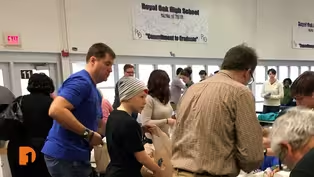
2025 Detroit Policy Conference explores innovation economy
Clip: Season 9 Episode 29 | 7m 4sVideo has Closed Captions
The Detroit Regional Chamber shares a preview of its 2025 Detroit Policy Conference.
The 2025 Detroit Policy Conference will focus on “Driving the Innovation Economy.” Key business, government and civic leaders will explore how the region can attract startups, high-tech companies, investment and talent to improve the innovation economy. Contributor Nolan Finley talks to Detroit Regional Chamber President and CEO Sandy Baruah about this year’s conference.
Problems playing video? | Closed Captioning Feedback
Problems playing video? | Closed Captioning Feedback
One Detroit is a local public television program presented by Detroit PBS

2025 Detroit Policy Conference explores innovation economy
Clip: Season 9 Episode 29 | 7m 4sVideo has Closed Captions
The 2025 Detroit Policy Conference will focus on “Driving the Innovation Economy.” Key business, government and civic leaders will explore how the region can attract startups, high-tech companies, investment and talent to improve the innovation economy. Contributor Nolan Finley talks to Detroit Regional Chamber President and CEO Sandy Baruah about this year’s conference.
Problems playing video? | Closed Captioning Feedback
How to Watch One Detroit
One Detroit is available to stream on pbs.org and the free PBS App, available on iPhone, Apple TV, Android TV, Android smartphones, Amazon Fire TV, Amazon Fire Tablet, Roku, Samsung Smart TV, and Vizio.
Providing Support for PBS.org
Learn Moreabout PBS online sponsorship(lighthearted music) - Sandy Baruah, CEO of the Detroit Regional Chamber, you've got your Policy Conference coming up at the Motor City Casino.
Tell me what we're gonna be talking about there this year.
- Yeah, so it's our Detroit Policy Conference, which is the conference that we created kind of as an outgrowth of the Mackinac Policy Conference to really focus on the Detroit region.
And it's something that obviously is a lot more accessible, we know going to the island can be a pain in the you know what, it can also cost a lot of money, so the Detroit Policy Conference is really geared towards our local issues.
And this year we're really focused on what the exciting new elements around the innovation economy mean for our region, really for the next 50 years.
- When we think about innovation, our mind doesn't automatically go to Detroit.
I think we think more about Silicon Valley and the coast, but here in Detroit, thanks to the auto industry, thanks to some really major universities and medical centers doing a lot of innovative things here as well.
- Absolutely.
In fact, people forget that the first patent and trademark office outside of Washington, DC was placed in Detroit, Michigan just because the level of innovation coming out of the companies in this region has been so high for so many decades.
What's changing, one of the key things that is changing is that we are now moving from company-based innovation, which is still absolutely critical, but we're moving to what they have like in Silicon Valley or the Research Triangle in North Carolina and these open innovation nodes.
The new Michigan Central new lab facility, which is just the first of a few that are coming online, Henry Ford Health and MSU are partnering for a new healthcare innovation lab up on Grand Boulevard right outside the Henry Ford main Hospital.
Dan Gilbert is building a new innovation complex in partnership with TechTown over at Wayne State.
And then of course, University of Michigan themselves is building a brand new innovation center right in Downtown Detroit.
- So what's driving all this, Sandy, I mean, why are we seeing this level of innovative activity in Detroit?
What's behind it and who's behind it?
- Nolan, that's a fabulous question.
And, you know, what's behind it is it's the next step.
We have an embarrassment of riches here.
Think of it.
We have three R1 universities in this state, MSU, Wayne State, and U of M, all pretty closely related.
We have a fourth R1 university up at Michigan Tech that's soon to be an R1 later on this year.
Having four R1 universities in this state is a huge economic driver.
It's a huge innovation driver.
And then we are now attracting young, talented people.
We need to attract a lot more.
But those are some of the things that are changing.
- Let's get back to that.
But those universities, all under new leadership now, and will they all be participating in this conference and what do they bring?
- Yeah, absolutely.
So we are anchoring our conference around Richard Florida, the author of the "Creative Class," who's been a long time friend and consultant to the Chamber.
He's going to be leading the discussion with the three R1s, you know, President Espy at Wayne State, President Guskiewicz at MSU, and President Ono from University of Michigan.
All three are going to be there in person.
We signed an agreement with the University of Michigan up at the Mackinac Policy Conference last year to start building out this innovation echo system.
So what you're going to see at the Detroit Policy Conference is kind of the beginning of the beginning of how we're going to work together with the R1 universities, with business leaders, people like Bob Riney, who will be there, economic development people, people like Ned Staebler, Kevin Johnson, Kofi Bonner, how are we all gonna work together to build out this echo system?
- And it's not all automotive.
I mean, the medical piece of this is rather significant too.
- Absolutely.
It's FinTech, it's medical sciences, and healthcare.
You know, it's AI, you know, and it's not automotive maybe in the traditional way, but you think about all the technology that goes into like autonomous vehicles or electrification, right?
That doesn't just apply to automotive, that applies to a whole range of growing industries on the planet.
- So let's get back to talent.
I mean, we are still losing more of our college graduates than we keep, and we are still lagging in job creation.
How does these innovative efforts play into attracting talented people and attracting job creators?
- Yeah, so the numbers are actually a little fuzzy.
What we're finding is that Michigan retains the dead average of its college graduates.
What we do lose, however, is disproportionate of our really high flyers.
People on the STEM fields, people in the medical fields, people with advanced degrees like in finance and things like that.
We're losing too many of those, what we need to do is make sure that young people, young talented people know that they're gonna be supported when they come here, that they're gonna have venture capital if they wanna start a business, that there are systems and entities in place to connect them not only to each other, so they can create kind of social networks, which is what happens naturally in Silicon Valley, but also to job opportunities.
- Well, so like Mackinac in the spring, this is a policy conference.
What policies do we need to support this effort?
- Yeah, so we're kind of, as a business community, we're kind of dividing and conquering.
Our friends at Business Leaders For Michigan, they're taking the lead on trying to create a statewide umbrella policy that really focuses on driving innovation, attracting these new young, talented people and the companies that they bring with them.
What we're focused on with the University of Michigan and the other two R1 university presidents and others, is how do we build out this echo system?
How do we connect the business community with the philanthropic community, with the education community, with all the services that are there?
And think about, you know, you've got the Center for American Mobility, you've got Mcity, you've got the airport, you've got Ford's new development in Dearborn.
I mean, you know, all this stuff, you start connecting these pieces together, we make the Research Triangle look like a pretty small triangle.
- So there's a money piece of this too.
I mean, these innovators, these startup companies, they need capital.
What's the venture capital environment here?
- So the venture capital environment in Michigan is growing and is growing pretty smartly.
In fact, it's one of the fastest growing in the country.
And you can talk to our friends at Renaissance, Chris Rizik, and others, and they'll tell you that there's a lot more there, but we still need to do more.
I mean, Michigan continues to be a story and Detroit continues to be a story of great progress, but we still have so much more to do.
Black churches provide sanctuary, support for mental health
Video has Closed Captions
Clip: S9 Ep29 | 6m 54s | Black churches provide sanctuary and support for youth facing mental health challenges. (6m 54s)
Things to do around Detroit this weekend: January 17, 2025
Video has Closed Captions
Clip: S9 Ep29 | 1m 41s | Peter Whorf of 90.9 WRCJ shares some events coming up around the region this weekend. (1m 41s)
Three Metro Detroit schools celebrate MLK Day by giving back
Video has Closed Captions
Clip: S9 Ep29 | 6m 5s | The Royal Oak, Berkley and Clawson school districts celebrate MLK Day by giving back. (6m 5s)
Providing Support for PBS.org
Learn Moreabout PBS online sponsorship
- News and Public Affairs

Top journalists deliver compelling original analysis of the hour's headlines.

- News and Public Affairs

FRONTLINE is investigative journalism that questions, explains and changes our world.












Support for PBS provided by:
One Detroit is a local public television program presented by Detroit PBS


